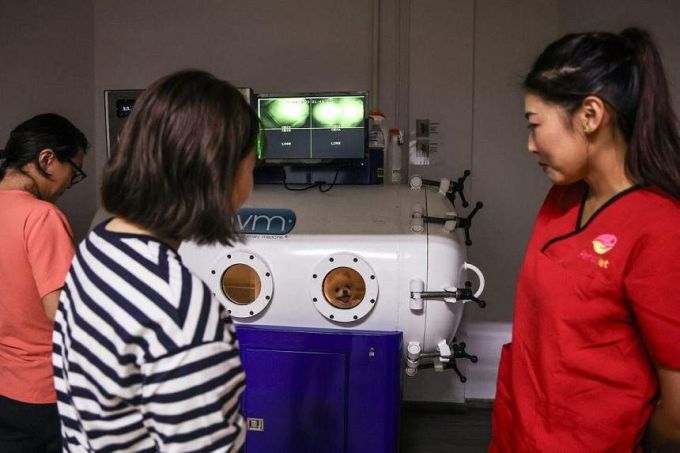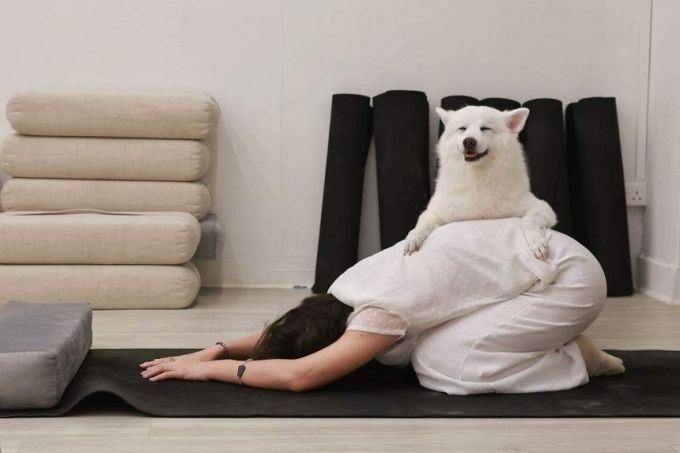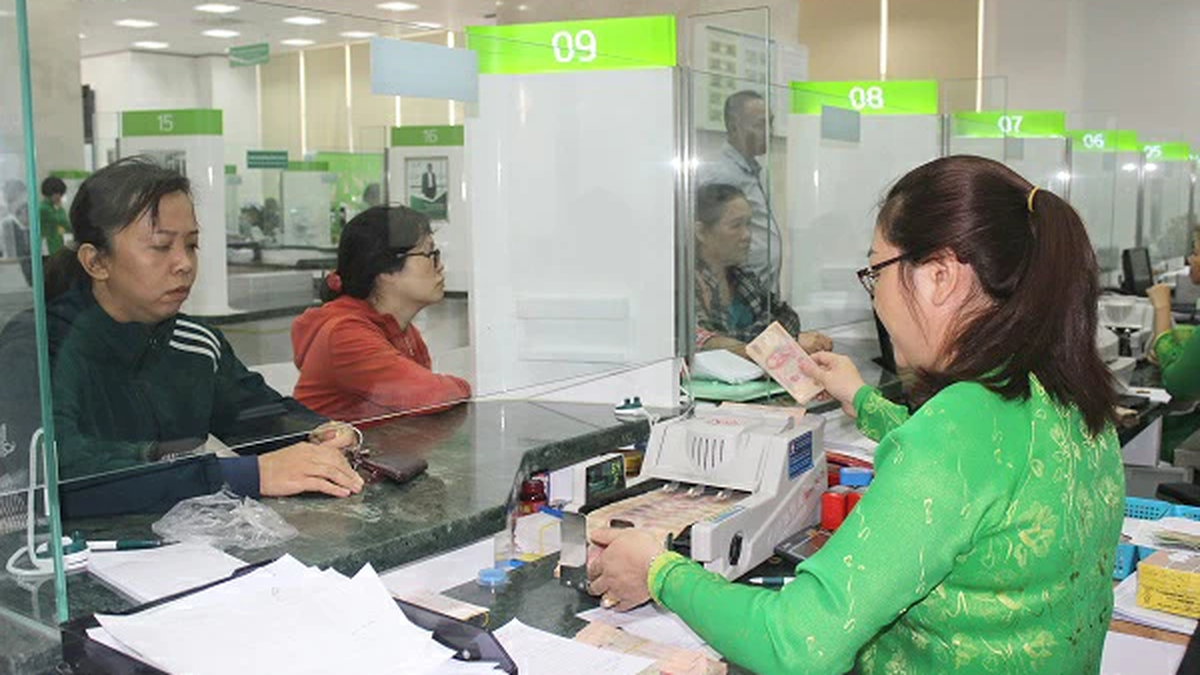Singapore Yoga, medicinal massage and luxury pet services thrive on well-off owners who see their pets as family members.
After undergoing $20,000 surgery for a herniated disc in August, Clarisse Tan’s 10-year-old Pomeranian, Yogi, was “very lethargic and wouldn’t walk.” She said Yogi had been an active dog but injured his back after falling off a sofa.
A relative introduced her to hyperbaric oxygen therapy (HBOT) at RehabVet, an animal rehabilitation clinic. After researching online, she decided to take Yogi for treatment in September.
The recommended course of treatment is 10 HBOT sessions at $250 each. By the fifth session, Yogi was playful and barking. In addition to a pressurized chamber with two bars (200,000 Pa or 200,000 N/m2) of pure oxygen, RehabVet offers a variety of treatments including physical therapy, hydrotherapy, and traditional Chinese veterinary medicine.
Veterinarian Sara Lam, 36, founder of RehabVet, says it is Singapore's only advanced veterinary clinic for animals. HBOT aids in the recovery of injuries as well as neurological and respiratory disorders. "Most owners will notice their pets seem more alert and have a better appetite after just one treatment session," she says.

Ms Clarisse Tan (left) and veterinarian Sara Lam observe Yogi's treatment. Photo: Hester Tan
Not only high-end physiotherapy, many other luxury services for pets have also been booming in Singapore recently. With yoga being a cornerstone of many people’s health and fitness regimes, trainer Audrey Sin, 26, decided that the practice should also be applied to dogs.
Puppy Yoga Singapore’s yoga sessions are for dogs and their owners. Sessions are conducted in small groups of up to eight people or privately. But Ms Sin says not all dogs are up for yoga.
“Some dogs like it and some get distracted and play. It depends on the temperament of the dog,” said Sin, who launched the service two years ago as a way for owners and pets to bond and spend more time together.
Dogs can participate passively by providing comfort to their owners during the workout or actively participate in the poses. For example, they can add resistance to certain poses. One-hour classes cost $44 for groups and $250 for private sessions.

A dog yoga training session by Puppy Yoga Singapore. Kevin Lim
Recently, with Tibetan singing bowl therapy gaining popularity, Puppy Yoga Singapore has also launched this service. All owners and their pets have to do is lie down on the mat together, relax, and let the sound of the bowls resonate over them. A private session costs $300.
Not only pet-specialized businesses, human services also open up a high-end care business for dogs and cats. For example, Capella Singapore. In 2021, they partnered with Petpawroni to launch a spa and accommodation service for pets, called Pet Spa-cation.
So far, more than 200 pets have signed up for the package. The Ayurvedic spa treatment will use herbs such as boswellia, neem and guduchi. Petpawroni founder Bernice Chen, 40, describes how the animals will be given a thorough bath before the herbs are rubbed into their fur.
After the herbal massage, they get another bath and a blow-dry. Depending on the size of the animal, each massage session costs between $80 and $160. "Some people bring their pets in weekly to address skin issues, while others come to condition their fur and prevent ticks and fleas," says Bernice Chen.
The standard pet spa caters to dogs and cats, but Capella Singapore also welcomes a wide variety of animals. While the majority of pets staying at the hotel are dogs – the maximum allowed is 30kg – other pets they have hosted include cats, rabbits, rats and even goldfish.
According to a report by Euromonitor International, the number of pet dogs in Singapore will be around 114,000 by 2023, up nearly 3% from 2019. The number of pet cats will hover around 94,000 this year, up nearly 10%. Not only are pet owners increasing their ownership, but they are also increasing their spending.
Kam Kok Yen, head of animal health at pharmaceutical company Boehringer Ingelheim, said the increased spending was driven by the “humanization” of pets. “The way consumers view and value pets has evolved, they treat them more like family members,” he explained.
According to strategic consulting firm Tractus Global (China), the size of Singapore's pet retail market increased from 78 million USD in 2016 to an expected level of 110 million USD in 2025, at a rate of 3-4% per year.
Research by Rakuten Insights found that 70% of Singaporeans aged 25-34 surveyed had pets before Covid-19. Since the pandemic, more and more young families in their 30s and 40s have also adopted pets as a way to teach their children responsibility and see them as family members.
Higher incomes give pet owners in the island nation greater financial freedom to care for their pets, according to Tractus. Food and treats are the biggest pet care expense, accounting for about 30% of total spending. Other expenses include veterinary care, pharmaceuticals, services, supplies, diagnostics and pet insurance.
In Singapore, the Animals and Birds Act 1965 does not consider animals to be sentient, meaning they have the ability to feel a range of emotions like humans. But whether they are sentient or not, pet owners are treating their pets as well, or in some cases, better than humans, according to the Straitstimes .
For example, Nicole Kow, 37, spent about S$200 on Rex Specs, which protect her dog’s eyes from wind, dust and sun when going to the park. Or Ms Chan, who is willing to spend about S$800 on paperwork and airfare to take her dog on a trip to Europe.
Tractus forecasts that Singapore’s pet industry will continue to grow rapidly as pet owners prioritize the well-being and happiness of their pets. At the same time, increased adoption of sustainable practices and integration of advanced technology will enhance the pet ownership experience for customers.
Phien An ( according to Straitstimes, CNA )
Source link



































































































Comment (0)